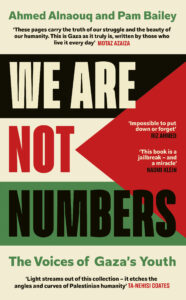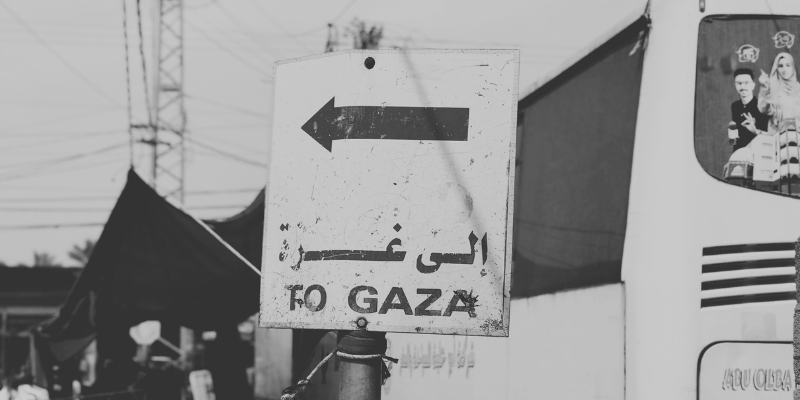Our mission with We Are Not Numbers (the NGO) was to create a new generation of Palestinian writers and thinkers, who could harness the power of their words to nonviolently resist their oppression and influence public opinion about the ongoing Israeli blockade of Gaza. WANN provides the world with direct access to Palestinian narratives without censorship or intermediaries. From 2015 to 2024, more than 1,300 stories were mentored and published by 323 young adult Palestinians.
We Are Not Numbers: The Voices of Gaza’s Youth is a selection of some of the best WANN essays and poems over a span of ten years—a unique, living history of Gaza as seen through the eyes of its youth. It was extremely difficult to narrow down the selection to what you find on these pages. We regret having to omit so many heartfelt and often surprisingly hopeful narratives.
The stories from the anthology show two truths that cannot be denied: the extent to which WANN’s members are like young people everywhere, with the same hopes and passions, and the significant talent they could contribute—if they were simply allowed to thrive.
It is these young people, and their determination to keep sharing their stories, who offer hope for the future.
Among our original cohort of writers, many have realized their dreams despite the barriers erected by the Israeli blockade and international inaction: Mosab Abu Toha is now an internationally acclaimed poet and essayist, Said Alyacoubi is a surgeon in the UK, Issam Adwan was hired as a journalist by the Associated Press, and Ahmed Alanouq served as a diplomat with the Palestinian embassy in London before devoting himself to WANN fulltime.
It is these young people, and their determination to keep sharing their stories, who offer hope for the future.
*
The Flour Massacre
by Ahmed Dader, mentored by John Metson
In the darkest days of the war on Gaza, people prayed for the arrival of aid trucks. Although attempts to get close to them were dangerous—Israeli soldiers often shot at the crowds—we were hungry and desperate. When my father and I ventured out for such a trip, our entire family anxiously awaited our return, not minding if we returned home empty-handed. I remember countless nights we went to bed with empty stomachs because we had nothing to eat.
The scene was reminiscent of an army of ants, all marching in one direction in search of food.
I remember one trip most clearly. On Wednesday, February 29th, 2024, my father and I travelled to find food for the nineteen children in our house. Ramadan was knocking at the door, so we wanted some food to break our fast, even if it was only dates, clean water, beans and rice.
We had left home at 10 pm the previous evening, and I thought we would be the only ones out at that time. But we saw a huge number of people flooding into the streets. All were prepared to face the brutality of the Israeli soldiers for the sake of some sustenance.
Al-Rasheed Street, where the trucks usually arrived, is seven or eight kilometres away from our house, and we were quite tired by the time we arrived. The streets were full of people. The scene was reminiscent of an army of ants, all marching in one direction in search of food. While waiting for the aid trucks to arrive, we found a temporary refuge in a destroyed building out of sight of Israeli snipers and waited there for almost three hours. We were tired and could easily have fallen asleep, but we forced ourselves to stay awake.
Finally, at 4:20 am, the trucks arrived to a cacophony of cheers. Thousands of desperate souls rushed towards the aid vehicles. Despite the rush of people, I managed to secure a bag of flour and began to make my way home. But then suddenly, out of nowhere, came a fusillade of bullets aimed at our heads and the upper parts of our bodies. Many people who were hit bled to death, since no medical crews or ambulances could reach them. It was like a battleground.
I will need years for the scenes of that night to fade in my memory; the blood of hungry Gazans flowed like a river in the streets.
I saw bullets strike two or three people at once, felling them instantly. Even those who were only injured were at risk of being trampled by people fleeing the bullets and shrapnel. The biggest mistake I made was not to take my phone with me to document the massacre that took place in front of my eyes. I remember well a young man who was carrying a bag of flour. Suddenly, a tank advanced and crushed him, smashing both him and his bag of flour into the ground.
I will need years for the scenes of that night to fade in my memory; the blood of hungry Gazans flowed like a river in the streets. The death toll was almost 130, but many more died in the following days, and around 800 were injured, most of them seriously.
Amid the chaos and devastation, I ran desperately for survival. Luck was on my side. With my bag of flour, I managed to escape the carnage. As I hurried back, I forgot to wait for my dad at the spot he had designated. Overwhelmed by exhaustion and the joy of obtaining some precious flour, I made my way home, unaware of what had happened to him.
When I finally arrived, Mama rushed to me, embracing me tightly, with tears streaming down her face while I tried to console her. She remained frantic until my father arrived as well, calling out to ask if I had made it home. She replied with a relieved “yes!” In that moment, a heavy burden lifted from her shoulders, and she thanked God for our safety. I later learned Dad had been terrified for me but couldn’t wait any longer, assuming I had already returned. He started home, clutching a packet of dates in his hands, narrowly escaping being run over by an approaching truck.
I will always remember the young man with the bag of flour who was crushed by the tank. In my mind, he will forever have a place in history as a symbol of the courage of the Gazan people, standing firmly in their resistance to ethnic cleansing and their will to survive.
*
Ahmed is still in Gaza and has been forced to relocate more than nine times. At one point, his home was destroyed, and his eight-month-old unborn daughter died when he and his wife were buried under rubble for three days. She would have been named Arya.
__________________________________

Abridged excerpt from We Are Not Numbers: Voices of Gaza’s Youth, curated by Ahmed Alnaouq & Pam Bailey. Text copyright © 2025 by Interlink Publishing Group. Reprinted by permission of Interlink Publishing. All rights reserved.
